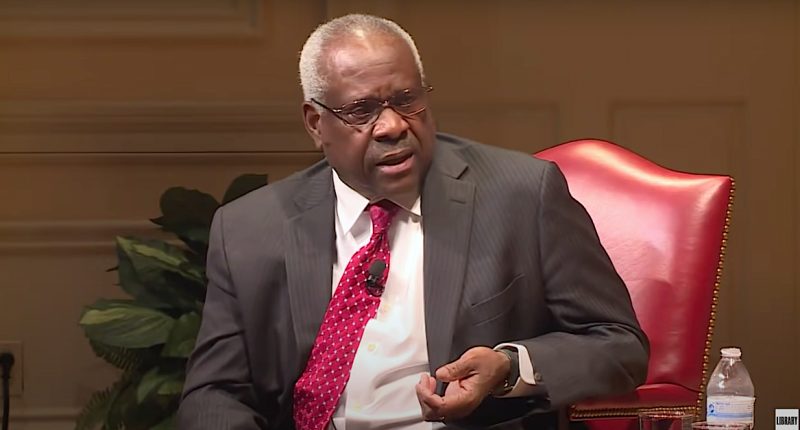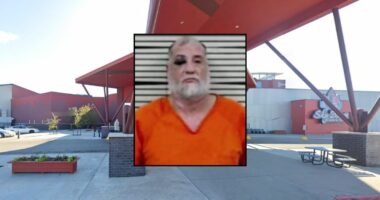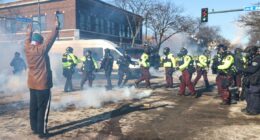Share this @internewscast.com
Associate Justice of the Supreme Court Clarence Thomas (YouTube/Library of Congress).
The Supreme Court justices refused to consider a case regarding Maryland’s assault weapons ban, which was put into effect following the 2012 Sandy Hook Elementary School tragedy in Newtown, Connecticut.
On the conservative side, three justices — Samuel Alito, Neil Gorsuch, and Clarence Thomas — expressed a willingness to hear the appeal, though they required one more vote to reach the four necessary to take the case.
The Snope v. Brown case contests Maryland’s Firearm Safety Act of 2013, which prohibits certain semiautomatic rifles, like AR-15s, and limits magazines over 10 rounds. Among the challengers are gun rights activists and advocacy organizations who claim that AR-15s are “the most popular gun in America” — a sentiment that seemed to resonate with Justice Thomas.
Love true crime? Sign up for our newsletter, The Law&Crime Docket, to get the latest real-life crime stories delivered right to your inbox.
The U.S. Court of Appeals for the 4th Circuit upheld Maryland’s ban in August 2024 on the grounds that the banned rifles are “dangerous and unusual” weapons outside the scope of Second Amendment protection of “arms.” The 4th Circuit’s opinion relied on a narrow reading of New York State Rifle & Pistol Association v. Bruen. The challengers appealed and the case was relisted by the justices at least 11 times before being finally rejected for review.
Thomas dissented from the denial of certiorari, calling the 4th Circuit’s underlying decision “surprising” given that the AR-15 is “the most popular civilian rifle in America.” According to Thomas, AR-15s “are clearly ‘Arms’ under the Second Amendment,” which then shifts the burden to Maryland to show that banning them is “consistent with this Nation’s historical tradition of firearm regulation” — as Thomas demanded in the Bruen decision.
To clear up any arguments in advance, though, Thomas noted, “I am not aware of any ‘historical regulation’ that could serve as ‘a proper analogue’ to Maryland’s ban.”
Thomas pointed out that Maryland relied on a historical tradition of prohibiting “dangerous and unusual weapons,” but argued that such logic would require the weapon in question to be both dangerous and unusual — and that AR-15s could not be considered “unusual” given that tens of thousands of Americans own one.
Thomas was completely unconvinced by the 4th Circuit’s logic that relying on popularity could lead to absurd consequences. The appellate court hypothesized a reality in which states could not constitutionally regulate bazookas, ricin pellet-firing umbrella guns, or nuclear warheads simply because those weapons had become sufficiently popular.
According to Thomas, the hypothetical illustrates precisely why the right to bear arms “cannot turn on judicial speculation about the American people’s self-defense needs.”
“Even if some nuclear warheads are small enough for an individual to carry, no reasonable person would think to use one to defend himself,” Thomas allowed. “Still less could nuclear warheads ever become a common means of self-defense.”
“To fend off the fantastical threat of Americans lobbing nuclear warheads at one another, the Fourth Circuit has allowed the very real threat of the government depriving Americans of the rifle that they most favor for protecting themselves and their families,” argued the justice.
Thomas continued, noting the urgency of the question the justices avoided by denying review.
“That question is of critical importance to tens of millions of law-abiding AR-15 owners throughout the country,” Thomas argued, noting that the justices have already avoided the question for “a full decade.”
As has been Thomas’ habit, he once again lamented the marginalized treatment he said courts have shown to the Second Amendment.
“I doubt we would sit idly by if lower courts were to so subvert our precedents involving any other constitutional right,” Thomas wrote. “Until we are vigilant in enforcing it, the right to bear arms will remain ‘a second-class right.””
Alito and Gorsuch officially stated that they would have heard the appeal, but did not join Thomas’ dissent. Justice Brett Kavanaugh, however, penned a brief statement in which he predicted that “this Court should and presumably will address the AR-15 issue soon, in the next Term or two.”
Despite Kavanaugh’s statement, he voted to deny certiorari in the case. Per the famed “Rule of Four,” a case only requires the votes of four justices in order for the full Supreme Court to hear the appeal.
You can read the full dissenting statement here.
















